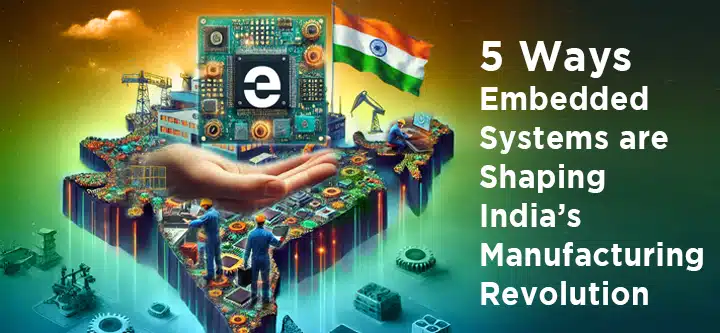How Embedded Systems Are Powering India’s Manufacturing Renaissance

Strong 8k brings an ultra-HD IPTV experience to your living room and your pocket.
India is no longer just the back office of the world, it’s becoming the smart factory of the future. Behind this industrial leap is a silent force transforming machines into intelligent systems: Embedded Technology.
From self-monitoring textile machines in Coimbatore to precision-controlled EV battery units in Pune, embedded systems are silently powering the country’s shift from manual to automated, from reactive to predictive, and from isolated to connected.
This isn't just an upgrade, it's a full-blown revolution, and it’s changing how India builds, scales, and competes on the global stage.
In this blog, let’s explore how embedded systems are:
- Making Indian factories smarter and more sustainable,
- Elevating quality and global competitiveness,
- And building a future-ready workforce from the factory floor to the firmware layer.
5 Ways Embedded Systems are Shaping India’s Manufacturing Revolution
1. Enabling Smart Factories (Industry 4.0)
Embedded systems are the unseen backbone of smart manufacturing. These tightly integrated hardware‑software units enable real‑time monitoring, automated process control, and instant feedback loops. In semiconductor production under the Make in India and Semicon India programs, embedded controllers help automate quality checks, minimize defects, and reduce wastage up to 25%
2. Strengthening Supply‑Chain Resilience
Post‑pandemic challenges have highlighted the fragility of traditional manufacturing networks. Embedded systems paired with IoT technologies now enable predictive maintenance, real‑time inventory tracking, and logistics optimization—empowering regional clusters like Pune and Ahmedabad to meet delivery timelines with precision
3. Driving Green and Efficient Production
Sustainability is no longer optional. Embedded IoT platforms regulate energy use, schedule machinery intelligently, and minimize idle time. Manufacturers implementing these systems have reported up to 30% gain in efficiency while reducing carbon emissions—a win–win for costs and the environment
4. Closing the Skills Gap with Intelligent Tools
While the need for skilled engineers in semiconductor, embedded, and firmware roles outpaces supply, embedded systems help bridge this gap through AI‑driven training tools—like AR simulations for equipment handling—and predictive analytics that support worker decision‑making. This allows companies to train personnel faster and reduce unplanned downtime by up to 20%
5. Elevating Product Standards with Real‑Time Insight
Precision and quality control are critical in sectors like automotive and electronics. Embedded sensors and microcontrollers continuously monitor equipment parameters, enabling defect detection in real time and reducing faulty outputs by ~25%. This precision positions Indian manufacturers to meet rigorous global standards.
Why the Embedded Revolution Matters for India
1. Resilience Amid Global Shifts
India’s focus on building domestic electronics and semiconductor design capabilities is anchored by initiatives such as Semicon India, aiming to reduce dependency on imports and strengthen local manufacturing prowess
2. Fast‑Growing Market Sectors
Sectors like electronics, electric vehicles, pharmaceuticals, and industrial automation are forecast to accelerate India’s industrial output from 17% of GDP to a target of 25% by 2030. Embedded systems are central enablers in these high-growth domains
3. Security, Control & Innovation
India’s homegrown chip projects such as SHAKTI (IIT Madras) and IRIS (ISRO) reflect a growing ecosystem for locally designed RISC‑V SoCs, offering secure identity and sovereignty over hardware development
4. Upskilling India's Workforce
Despite fluctuations in semiconductor hiring, demand for embedded firmware developers, RTOS experts, and IoT engineers remains robust. Salary ranges for entry-level to senior engineers range from ₹3–20 LPA, with growth fueled by programs like Chips to Startup.
The Path Forward: Innovation, Integration, Impact
Edge AI & Embedded Intelligence
Embedded programming is rapidly shifting toward edge‑AI, allowing devices to perform inference locally using frameworks like TensorFlow Lite or STMicroelectronics’ STM32Cube.AI. This is especially impactful in applications such as predictive maintenance, biometric sensors, and EV telematics.
IoT‑Driven Automation Across Industries
From pharma cold‑chain systems to data center uptime, the fusion of IoT and embedded platforms is transforming connectivity and process automation across verticals—from agriculture to smart cities.
Security & AI Embedded in Firmware
As cyber threats rise, embedded engineers are designing secure firmware and OTA infrastructure with encryption, tamper detection, and AI‑aided diagnostics—all necessary for reliable industrial operations
Key Takeaways
| Area | Impact |
| Efficiency & Automation | Embedded systems reduce production errors, waste, and downtime by automating quality control and predictive operations |
| Sustainability | IoT‑enabled energy management promotes greener, leaner manufacturing |
| Competitive Edge | Real‑time quality control and embedded innovation boost India’s global manufacturing reputation |
| Workforce Empowerment | Embedded platforms accelerate skill development, even amid talent shortages |
Embedded systems are far more than just chips in machines, they are the strategic enablers of India’s industrial upshift. Through automation, real-time insight, sustainability, and secure hardware development, these systems underpin India’s journey toward becoming a resilient, self-reliant manufacturing powerhouse.
Evolute Group, with its embedded hardware and firmware expertise across fintech, cleantech, industrial IoT, and automation, continues to play a vital role in delivering India’s smart manufacturing ambitions.
Note: IndiBlogHub features both user-submitted and editorial content. We do not verify third-party contributions. Read our Disclaimer and Privacy Policyfor details.







